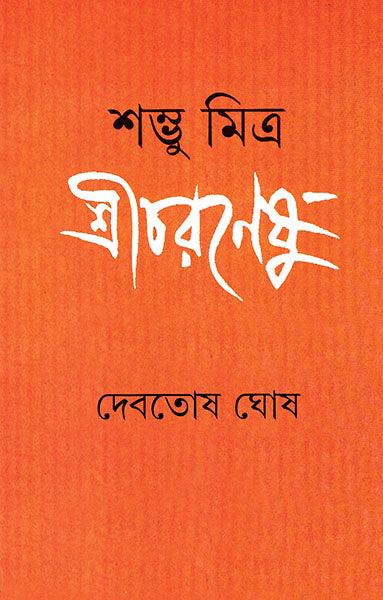Shambhu Mitra Shricharaneshu
Shambhu Mitra Shricharaneshu is backordered and will ship as soon as it is back in stock.
Couldn't load pickup availability
Genuine Products Guarantee
Genuine Products Guarantee
We guarantee 100% genuine products, and if proven otherwise, we will compensate you with 10 times the product's cost.
Delivery and Shipping
Delivery and Shipping
Products are generally ready for dispatch within 1 day and typically reach you in 3 to 5 days.
- Author: Debotosh Ghosh
- Publisher: Ananda Publishers
- Language: Bengali
- Genre: Prabandha - Prabandhaguchcha - Prabandhasangraha
- Edition: Hardcover
- ISBN: 9789350405604
- Pages: 130
- Weight: 272 grams
Book Description
Shambhu Mitra Shricharaneshu is a tribute to one of the most iconic figures in Bengali theatre, Shambhu Mitra, by his close associate, Debotosh Ghosh. The book serves as both a historical account and a personal memoir, chronicling the life and legacy of Shambhu Mitra and his immense contribution to Bengali theatre.
-
Key Features:
- Bengali Theatre History: This book delves into the history of Bengali theatre, focusing on Shambhu Mitra’s pivotal role in its evolution. His works in professional theatre, his leadership in Gananatya Sangha, and his directorial accomplishments such as ‘Nabanna’ and the Mahurupi group, are central to the narrative.
- Personal Reflections: The author, a long-time collaborator and admirer of Shambhu Mitra, shares personal anecdotes, memories, and insights into his experiences working with Mitra, bringing the theatre legend's life to the forefront.
- Theatre as a Creative Struggle: The book also paints a vivid picture of the creative struggles that Mitra faced during his career. From directing influential plays like ‘Raktakorobi’, ‘Raja’, ‘Putul Khela’, and ‘Oedipus’ to shaping the theatre scene in Bengal, the book captures his passion, dedication, and vision for the stage.
- Legacy of Mahurupi: Special attention is given to Mitra's involvement with the Mahurupi theatre group, highlighting the creative peak of his career during this time.
-
Historical Context:
- Theatre in Post-Colonial Bengal: The book contextualizes Mitra’s contributions within the broader landscape of Bengali theatre during the 20th century, exploring the artistic revolution that took place during that period.
- Artistic Struggles and Triumphs: It also covers the triumphs and struggles Mitra faced within the complex sociopolitical environment of Bengal during the mid-20th century, shedding light on the challenges of bringing theatre to the masses while maintaining its artistic integrity.
-
Key Highlights:
- Reflections on Shambhu Mitra’s Work: Ghosh gives an insider’s perspective on Mitra's directing style, his creative process, and his revolutionary contributions to Bengali theatre.
- Personal Encounters: The book offers a unique glimpse into the personal relationship between Ghosh and Mitra, providing rich first-hand narratives of their collaborations.
- Theatre as a Medium for Change: An exploration of how Mitra's theatre was more than just entertainment but a catalyst for social change and awareness during tumultuous times.
Key Sections:
- Shambhu Mitra’s Early Life: A look into Mitra’s formative years, his entry into the world of theatre, and the initial struggles he faced.
- Mitra’s Works with Mahurupi: In-depth analysis of the Mahurupi theatre group and how it became a platform for creativity under Mitra’s guidance.
- Memoirs of a Theatre Companion: Debotosh Ghosh shares his personal journey alongside Shambhu Mitra, offering readers insightful reflections on their artistic and personal bond.
Perfect For:
- Theatre Enthusiasts: Ideal for readers who want to explore the rich history of Bengali theatre and its luminaries, especially the life and works of Shambhu Mitra.
- Students of Theatre Arts: A must-read for anyone studying theatre direction, performance, or history of Bengali theatre.
- History and Culture Buffs: Readers interested in cultural history and the evolution of Indian theatre during the 20th century will find this book invaluable.





